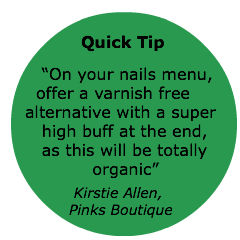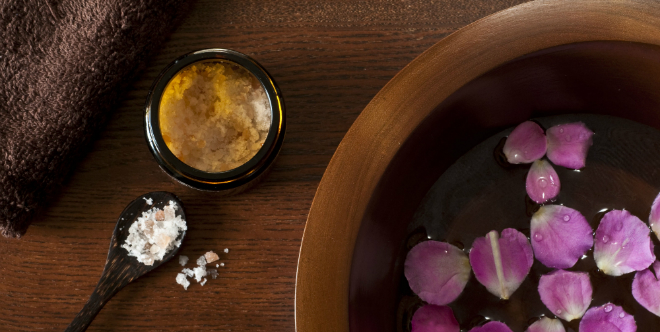Natural remedies
Natural substances have been used for their beautifying properties long before this sector became the multi-billion pound industry that it is today. The market is littered with products rich in plant extracts or natural oils, used for their vitamin content or moisturising effects. The handful of products on my desk as I sit here writing this contain such ingredients as fennel seed extract, evening primrose oil, sunflower seed oil and bamboo stem extract.
But there is a long way between skincare that contains some naturally sourced ingredients, and a product that is truly natural, even further to one that is truly organic. The recent statement from Peter Melchett, policy director of the Soil Association, the UK body that oversees and certifies organic products, about the potential dangers of chemicals used in so many beauty products echoed the concerns of many organic manufacturers and spa owners.
But while there will always be fervent believers in the benefits of organic skincare, for the everyday client, how much does it all really matter?
 According to the statistics, organic and natural skincare has enjoyed some robust growth in recent years. The Soil Association notes a 6% growth in sales of organic health and beauty products in 2012, to £31.8bn. Sales at the market leader, Neal’s Yard Remedies, swelled by almost 13% in that time. Organic Monitor anticipates continued growth of the sector to 2016.
According to the statistics, organic and natural skincare has enjoyed some robust growth in recent years. The Soil Association notes a 6% growth in sales of organic health and beauty products in 2012, to £31.8bn. Sales at the market leader, Neal’s Yard Remedies, swelled by almost 13% in that time. Organic Monitor anticipates continued growth of the sector to 2016.
Potential pitfalls
Anecdotal reports from industry experts report similar findings. “We had a 34% increase in our business last year,” says Tracy Smith, the founder of SkinSmith, the UK distributor of the Eminence Organic Skincare, adding that figure is consistent with both consumer and spa clients.
The reports from spas are also positive. “We’ve been open three years,” says Kirsty Taylor, founder of Uniquely Organic Eco Spa in Hove, Sussex. “I’ve definitely noticed a positive change.”
Despite the apparent popularity with consumers, introducing organic or natural skincare into your business is easier said than done. There are no legal standards for natural or organic beauty products, allowing brands to make ambiguous or deceiving claims about their products. When it comes to skincare, what does organic actually mean?
 The Soil Association says that in order for a product to be certified as organic, 95% of its agricultural ingredients must be organic; at least 20% of it total ingredients must be organic; and where an ingredient is available in organic form. The Soil Association will also certify a product if 70-95% of its agricultural ingredients are organic, but its percentage must be labelled.
The Soil Association says that in order for a product to be certified as organic, 95% of its agricultural ingredients must be organic; at least 20% of it total ingredients must be organic; and where an ingredient is available in organic form. The Soil Association will also certify a product if 70-95% of its agricultural ingredients are organic, but its percentage must be labelled.
And that isn’t the only certification that brands can seek. Alongside the Soil Association, Eco-Cert and Cosmebio certify organic products in France, BDIH in Germany, ICEA in Italy, and United States Department of Agriculture (USDA) in America. What’s more, in order to create some uniformity in Europe, the associations in Britain, France, Germany and Italy launched the Cosmos standard last year, as a European wide certification standard for both organic and natural beauty products. In 2016, Cosmos will replace all domestic certification standards in Europe.
False claims
The practice of brands labelling their products as organic when they only contain a small percentage of organic ingredients is rife. “We call that greenwashing,” explains Kim Allan, director of Botanical Brands, which distributes New Zealand skincare brand Living Nature in the UK. “It confuses the customer and the spa owner, but it’s everywhere in the industry. And unfortunately we get tarred with the same brush.”
Kirstie Allen, director of organic skincare brand Pink’s Boutique, agrees. “You could go home tonight, mix up a pot of cream in your kitchen, put 1% organic lavender in, and then label it ‘organic’, and then sell it into a spa,” she says. “There’s literally no regulation to it.”
Indeed, finding a brand that is genuinely organic remains the biggest challenge facing business owners. “A good place to start is check if there’s a certification behind the company,” Taylor points out.
Kim Allan, whose Living Nature products are certified natural by BDIH, due to their using wild-crafted ingredients such as manuka honey that cannot be classed as organic, suggests using resources such as the Skin Deep Cosmetics Database to check out the ingredients used in a product and the associated risks.
“I personally look more towards the creator of the brand,” explains Steph Cosby, the spa manager at organic hotel spas The Scarlet and Bedruthan in Cornwall. “I like to understand why they chose the ingredients they did, and I like to hear their story and their passion for what they do.”
Education is key
Kirstie Allen says that getting organic skincare onto the college syllabus will be crucial towards increasing understanding about organics within the industry. “It doesn’t exist in any part of therapists’ formal training, so it’s completely new to them,” she explains.
Indeed, with clients increasingly aware of greenwashing, it’s more important than ever that therapists using organic products are well versed in their ingredients and the benefits.
“Clients are much more aware of products claiming they’re organic but they’re actually not,” says Taylor, adding that she’s seeing an increase in clients asking if the products used are Soil Association certified. “Therapists need to know their raw materials,” agrees Fran Johnson, head of formulations at Neal’s Yard Remedies. 
Her colleague, Nicola Nolan, PR and marketing director at Neal’s Yard Remedies, explains that the growth of social media and online forum facilities is helping to push organic skincare into the mainstream for consumers. “They can access everything from ingredients lists to associated health and concerns around certain ingredients and fully detailed criteria on the different certification standards available.”
The widely held concern that an organic alternative would be prohibitively expensive is being put to rest. “We're still able to be very competitive in the market place,” says Cosby. She admits that stocking exclusively organic products has hit her bottom line, but as the organic market is growing the opportunities for spas to secure lower prices will inevitably appear.
Taylor says the products that she stocks are on a par price-wise with the non-organic offering of her competitors. “When you look at their retail prices compared to the synthetic professional ranges, they’re the same, if not a little less,” she says. “I think that perception of organics being more expensive is not necessarily true any more.”
Eco fix
Although awareness among clients may be on the rise, offering something that’s just organic is not enough to compete in today’s market. In a speech at the Organic and Natural Beauty Show in June, Betty Santonnat, development director as Cosmebio, explained that being organic can no longer be a brand’s USP; it is only an entry point to the market. “Some years ago, if you launched an organic product, that was sufficient for retailers,” she says. “Today, there are so many products that are organic that you have to differentiate yourself.”
Smith says the fact that Eminence is organic only appeals to a small proportion of its market. “Ultimately the desire for results overrides everything,” she says.
 According to industry experts, organic products could in fact be more effective at achieving those results. Taylor says that after close examination of various beauty products as part of her cosmetic science education, she firmly believes that organic products will get better results in the long term than synthetic ones. Kim Allan agrees. “Because Living Nature’s products are 100% natural, everything in them is good for the skin, as opposed to other mainstream products that might include things that aren’t necessarily of any benefit,” she says.
According to industry experts, organic products could in fact be more effective at achieving those results. Taylor says that after close examination of various beauty products as part of her cosmetic science education, she firmly believes that organic products will get better results in the long term than synthetic ones. Kim Allan agrees. “Because Living Nature’s products are 100% natural, everything in them is good for the skin, as opposed to other mainstream products that might include things that aren’t necessarily of any benefit,” she says.
What’s more, therapists are reporting a rise in the number of clients seeking out organic skincare to treat skin complaints. “People are coming to us now for remedial work,” says Nolan. “It’s actually that they’ve got problem skin that they want fixed, which then leads to that heightened awareness of what they’re putting their skin through.”
Indeed, there is a confidence among the organic skincare brands that their products will speak for themselves. As Smith says, “Once clients see and feel the difference, the become far more open to the idea that organic skincare is serious anti-oxidant skincare, not just a fad.”
Picture credits: (from top) The Scarlet; Pinks Boutique; Pinks Boutique; The Scarlet

